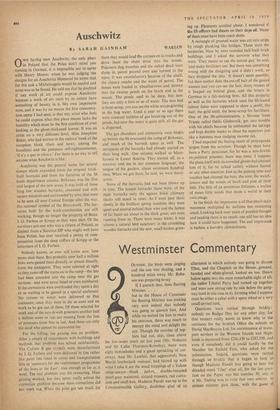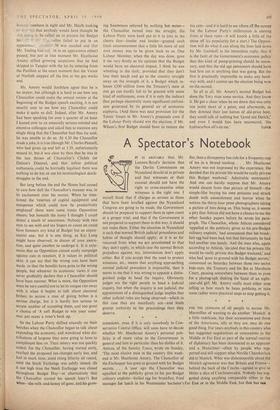Westminster Commentary
OUTSIDE, the birds were singing and the sun was shining, and a hundred miles away Mr. Robe- son was preparing to say If I quench thee, thou flaming Minister. . . .
but in the House of Commons the flaming Minister was making very sure indeed that nobody was going to quench him. And while we waited for him to make his entrance, there was much to occupy the mind and delight the eye. Though the number of top- hats had not, alas, risen above the low-water mark set last year (Mr. Nabarro and Sir Colin Thornton-Kemsley), there were eight buttonholes and a good sprinkling of cut- aways. And Mr. Leather, that aggressively New World lumberjack manqué, had turned up with what I take it are the usual trappings of a Yukon whip-sawyer—black jacket, double-breasted pearl-grey waistcoat, striped trousers, red carna- tion and snuff-box. Madame Pandit was up in the Commonwealth Gallery, doubtless glad of an afternoon in which nobody was going to discuss Tibet, and the Chaplain to the House, gowned, banded and white-gloved, looked on too. Down below again was the most remarkable sight of all; the entire Liberal Party had turned up together and were now sitting side by side below the gang- way (and in one case in it), forming what I suppose must be either a cabal with a spare wheel or a very small serried rank.
Questions were rattled through briskly : nobody on Budget Day (or any other day, for that matter) really wants to know why in the estimates for the Scottish Office the subsidy to David MacBrayne Ltd. for maintenance of trans- port services in the Western Islands and High- lands is increased from £246,150 to £282,100, and even if somebody did it could hardly be the Member for Enfield East, who asked for the ,information. Indeed, questions were rattled through so briskly that it began to look as though Madame Pandit was going to hear the dreaded word 'Tibet' after all, for the last ques- tion on the Paper was but number 50, and in it Mr. Teeling was to raise that very subject. •NI sixteen minutes past three, with the guest of honour nowhere in sight and Mr. Heath looking sn .eu that anybody would have thought he vas going to be called on to present the Budget hit. ..ellor failed to put in an appearaii, .stin, 50 was reached and (for Mr. Teeling hau • ut in an appearance either) passed; but just at tnat moment Mr. Heathcoat Amory stilled growing suspicions that he had skipped to Tangier with the lot by entering from the Pavilion at the exact moment that the Victor of Norfolk stepped off the line at the gas works end.
Mr. Amory would doubtless agree that he is no drator; but although it is hard to see how any Chancellor could make the annual review at the beginning of the Budget speech exciting, it is not exactly easy to see how any Chancellor could make it quite so dull. Indeed, after Mr. Amory had been speaking for over a quarter of an hour I leaned over to an unusually serious-minded and attentive colleague and asked him to mention any single thing that the Chancellor had thus far said; he was unable to do so. At 4.30 the Chancellor made a joke, it is true (though Mr. Charles Pannell, who had given up and left at 3.39, unfortunately missed it), but it was clear by then that he was in the last throes of Chancellor's Clichds (or Dalton's Disease), and that unless political euthanasia could be hurriedly legalised there was nothing to do but sit out his terminological death- struggles to the end.
But long before the end the House had ceased to care how dull the Chancellor's manner was, in its excitement over his matter. When he men- tioned the 'reserves of capital equipment and manpower which could now be productively employed' there were some ironic Opposition cheers; but beneath the irony I thought I could detect a touch of uneasiness. Nobody with two eyes to see with and ten fingers to count on could have foreseen any kind of Budget but an expan- sionist one; but it is one thing, as Kai Lung might have observed, to dream of your execu- tion, and quite another to undergo it. It is axio- matic that an Opposition cannot easily campaign against cuts in taxation, if it values its political skin; it can say that the wrong cuts have been made, or that 'the benefits have gone to the wrong people, but whatever its economic views it can never profitably declare that a Chancellor should have been meaner. What'is more, the-Opposition must be very careful not to let its tongue run away with it when it begins to 'talk about electoral bribes; to accuse a man of giving bribes is a serious charge, but it is hardly less serious to accuse another of accepting them, and too great a chorus of 'A soft Budget to win your votes' may put many a voter's back up.
So the Labour Party shifted uneasily on their benches when the Chancellor began to talk about expanding the economy, and wondered what dis- tributions of largesse they were going to have to compliment him on. Their misery was not quickly ended; for the Chancellor, having started early, reached the proposed tax-changes early too, and had to mark time, amid. rising hilarity all round, until the Stock Exchange was safely closed. (Is it not high time the Stock Exchapge was closed throughout Budget Day—or alternatively that the Chancellor started his speech later?) But when—the milk-and-honey all gone, and his grow- ing hoarseness relieved by nothing but water— the Chancellor turned into the straight, the Labour Party were hard put to it to join in the cheers that—louder and louder—greeted each fresh announcement that a little bit more of our own money was to be given back to us. One Labour Member, when the day was done, gave it me very firmly as his opinion that the Budget would have no electoral impact. I think he was whistling in the dark; provided that they don't lose their heads and go to the country straight away on the strength of it, a Budget which re- leases £300 million from the Treasury's maw at one go can hardly fail to be greeted with some kind of enthusiasm, even if it is only the indirect (but perhaps electorally more significant) enthusi- asm generated by its general air of economic euphoria. (And there was neat provision for the Tories' future in Mr. Amory's proposals even if the Labour Party should win the election; if Mr. Wilson's first Budget should have to restore the tax cuts—and it is hard to see where all the money for the Labour Party's millennium is coming from at these rates—it will knock a little of the shine off his popularity for a start.) The Opposi- tion will do what it can along the lines laid down by Mr. Gaitskell in his immediate reply; that it is the fault of the Government's economic policy that this kind of pump-priming should be neces- sary, and that the old age pensioners should have had first cut at anything that was going. But the first is practically impossible to make any head- way with, and I cannot see the election being won on the second.
So all in all, Mr. Amory's second Budget has done the Tory state some service. And they know it. He got a cheer when he sat down that was only one point short of a pavan, and afterwards, as they downed their last halves of old-price beer, they could talk of nothing but 'Good old Derick,' and even I would fain have murmured, 'the















































 Previous page
Previous page